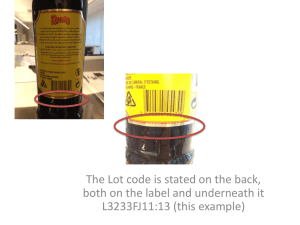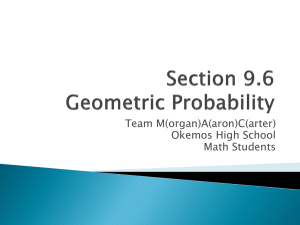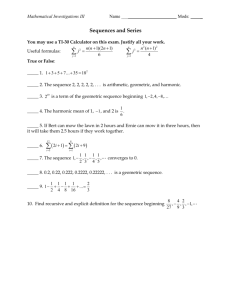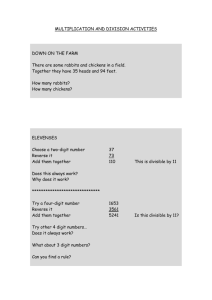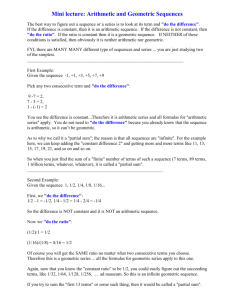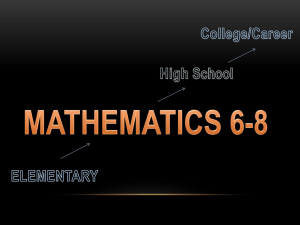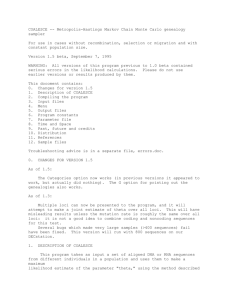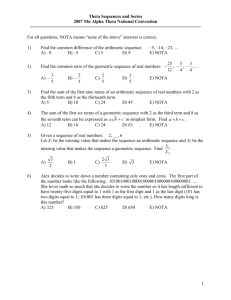Answers and Solutions
advertisement
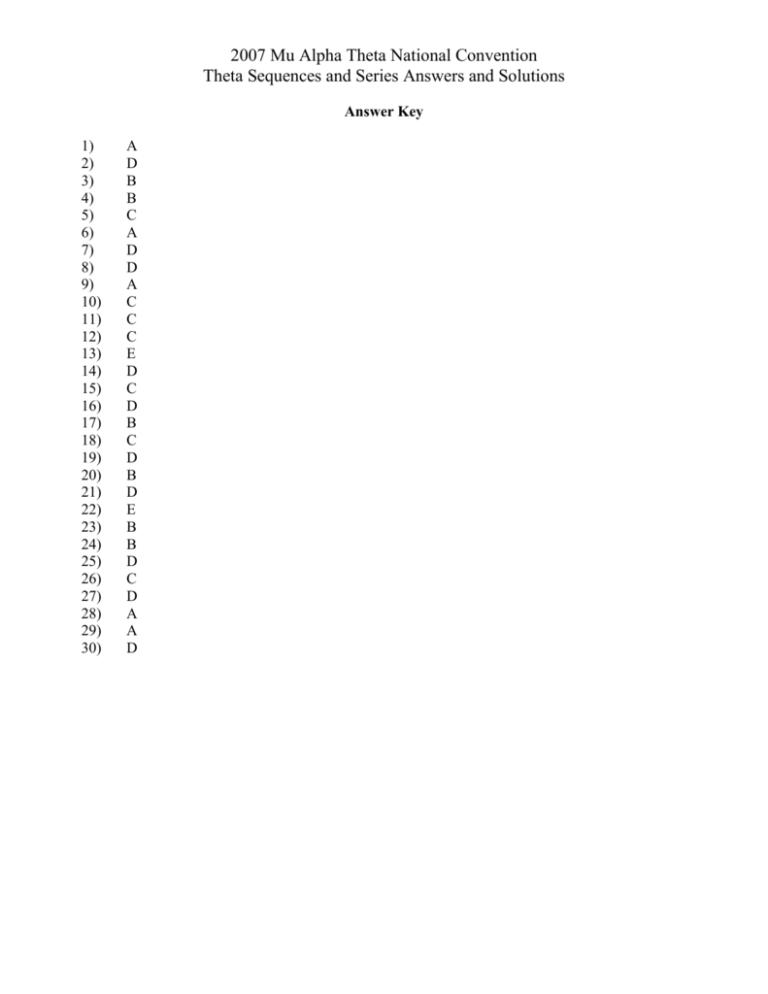
2007 Mu Alpha Theta National Convention Theta Sequences and Series Answers and Solutions Answer Key 1) 2) 3) 4) 5) 6) 7) 8) 9) 10) 11) 12) 13) 14) 15) 16) 17) 18) 19) 20) 21) 22) 23) 24) 25) 26) 27) 28) 29) 30) A D B B C A D D A C C C E D C D B C D B D E B B D C D A A D Theta Sequences and Series Solutions 1) 14 5 9 A 5 4 5 12 3 2) D 25 12 4 25 5 3) a5 2 , a13 8 , a13 a5 8d 8 2 d 3 4 , 2 a1 3 4 5 1 a1 1, S9 9 2 2 1 3 4 9 1 18 B 4) a3 2 , a7 8 , a7 a3 r 4 8 2 r 2 , 2 a1 2 2 a1 1 , 1 2 6 7 7 1 2 7 2 7 S6 7 2 7 16 B 1 2 1 2 4 2 3 5) X 1 4 , X 2 2 3 C 3 2 3 6) 1: one 1, one digit; 101: two 1s, three digits; 101001: three 1s, six digits; etc. Let n be the nn 1 2526 325 A number of 1s in the number, then there are digits. 2 2 7) The distances traveled north are in a geometric sequence and the distances traveled southeast are also in a geometric sequence. Total distance = 1 2 1 2 2 2 1 4 2 4 ... 1 1 2 1 4 ... 2 2 2 2 4 ... = 22 2 D 12 20 2 6 220 1 260 D S 20 8) 60 2 6 d 12 1 d 2 2 2 30 210 830 1 3780 , Total women = 30 220 1630 1 7560 . 9) Total men = 2 2 Difference = 3780 A 10) The first 4 should be known: 11 1 ; 22 4 ; 33 27 ; 44 256 . The units digit of 5 to any power is 5 and the units digit of 6 to any power is 6. 7, 8, and 9 have patterns: units digits for 7: 71 7 ; 72 9 ; 73 3 ; 74 1 ; 75 7 77 74 73 3 1 3 units digits for 8: 81 8 ; 82 4 ; 83 2 ; 84 6 ; 85 8 88 84 84 62 6 units digits for 9: 91 9 ; 92 1 ; 93 9 ; 94 1 ; 95 9 99 94 95 9 1 9 1 4 7 6 5 6 3 6 9 47 7 C 2 R 2 11) Area of largest semicircle = R 2 ; Area of next largest = R 2 ; next largest = R 22 2 8 32 Area of shaded region = 2 2 1 1 1 1 R 2 1 ... R 2 R C 2 8 32 128 2 4 16 64 2 1 1 4 5 1 2 3 97 98 99 3 4 98 99 1 1 2 1 1 2 ... 12) ... C 3 4 5 99 100 101 3 4 98 99 100 101 100101 5050 13) 8:00am–10:00pm=840 min. 1st cycle=18min. 2nd cycle=36min 18 36 72 144 288 558 , There are 5 complete cycles. E 18 36 72 144 288 576 1134 R2 R2 R2 R 2 ... Theta Sequences and Series Solutions 14) This is a geometric series with a common ratio of n 1 i 1 1 i D . The infinite sum is 2 1 i 1 2 n 1 1 15) Let an and bn . an and bn are convergent geometric sequences. 2 3 n n 1 1 cn . I) False. cn does not necessarily have a constant common ratio. II) False. 2 3 cn does not necessarily have a constant common difference. III) True. The sum of two convergent sequences is also convergent. C 16) For a quadratic sequence, the difference between terms increases linearly. Thus the difference 4 7 3 is decreasing by 7 according to the triangle: 4 3 The quadratic expression for each 7 term is: 4 3n 1 7 n 1n 2 7 n 2 27 n 6 7 27 6 23 D 2 2 2 2 2 17) a3 1 2 3 , a4 3 1 2 , a5 2 3 1 , a6 1 2 3 , a7 3 1 2 B 18) Let x 6 6 6 ... x 2 6 x x 2 x 6 0 x 2,3 ; x must be positive C 4101121 41011 101 1330 D 6 2 n 1 n 1 12 3 B 20) This is a geometric series with a ratio of 1 3 and the first term is 1 2 . 11 3 4 10 10 19) 12 32 52 ... 2n 1 4n 2 4n 1 2 2007 21) log 3 n 1 log 3 2 log 3 3 ... log 3 2007 log 3 2008 log 3 2 3 ... 2008 log 3 2008! D n 1 2 log 3 20! 77 C 2 27 8 2 1 2 1 1 2 1 1 1 5 a , b r3 r 22) E 4 3 6 6 3 9 6 9 18 14 27 3 23) The ball falls 12 feet, rebounds 12/5 feet to a maximum height, then falls another 12/5 feet back 12 12 down to the ground, and so forth. The total distance is: 12 2 2 2 ... 5 5 n 15 12 1 = 12 2 n 12 24 12 24 18 B 11 5 n 1 5 n 1 5 24) a1 , d e a10 e 10 1 9e 8 25) I) True a bn n0 n a , II) True 1 b B n 1 1 1 1 which diverges because 1 n b a n0 b n0 a b III) True, a b is always less than 1 for any positive integer n. n a2 a a a n 2 2 2 a bn D IV) True a b a b 2 2 1 b 1 b 1 b 1 b 1 b n 0 n 0 n 0 26) The common difference is not constant (not arithmetic) and the common ratio is not constant (not geometric). C Theta Sequences and Series Solutions 1 1 1 1 1 1 1 1 1 1 1 1 ... 27) ... ... 2 3 4 9 8 27 2 4 8 3 9 27 12 13 1 1 1 D 11 2 11 3 2 2 5 2 3 28) The coefficient would be: 3x 4 4 y 5760 x8 y 3 A 2 2007 n 1 2 2007 29) log log log ... log log 1 log 2 log 2 log 3 log 3 log 4 ... n 1 2 3 2008 n 1 log 2006 log 2007 log 2007 log 2008 log 1 log 2008 log 2008 A 30) The frog jumps on lily pads 1, 2, 3, 4, 5, 4, 5, 6, 7, 8, 9, 8, 9, 10, 11, 12, 13, 12, 13, … The lily pads that are hit more than once are: 4, 5, 8, 9, 12, 13, 16, 17, … We divide the sequence into two different arithmetic sequences: I) 4, 8, 12, 16, … II) 5, 9, 13, 17, … Let n be the nth term of the second sequence. We want to find the largest value of n such that 4n 1 50 n 12 . There are 12 terms in the second sequence, thus the frog jumps on 24 lily pads. D
